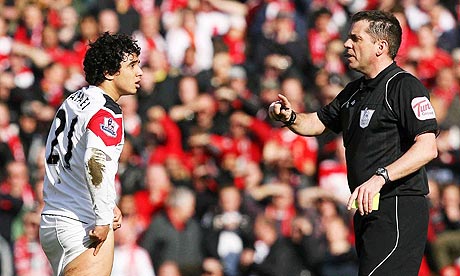Padfoot
The Persecuted One
Hardline defence of referees is a symptom of failure
Putting match officials beyond criticism is a distraction from the real problem: the current system of refereeing is inadequate
Paul Hayward
The Observer, Sunday 13 March 2011

Referee Phil Dowd has a non-sending-off word with Manchester United's Rafael da Silva. Photograph: Lindsey Parnaby/EPA
Respect for referees was always going to be a hard sell in a culture where civility has broken down, vituperation plagues the blogosphere and the streets seethe with random fury.
What chance a man with two cards and a whistle commanding the obedience of football folk, who are locked into a perma-state of tribal myopia? But there is a confusion at the heart of the recent kerfuffles over managers criticising match officials and it has to do with that word "respect". Good manners and consideration should not extend to meekly accepting decisions that are just plain wrong and then not being allowed to talk about them.
Allow me a personal reflection. I have always felt it right to defend the referee against a lynch mob, especially when attacks became a softening-up tool for clubs to protect their interests. There was always an imbalance between players and managers not admitting human error while officials were subjected to trial by television for decisions made at lightning speed and without the benefit of replays or multiple camera angles.
So far, so obvious. But over the past two weeks it has felt impossible to justify the performances of Martin Atkinson in the Chelsea-Manchester United Premier League match or Massimo Busacca in this week's Barcelona-Arsenal Champions League second leg. Atkinson's failure to send off Chelsea's David Luiz for a glaring second bookable offence and the dismissal of Arsenal's Robin van Persie for going through with a shot after the whistle had blown for offside were too grievous to dismiss with platitudes.
An aside about Van Persie's offence: time-wasting by booting a ball into the stands is virtually impossible at that level anyway because a young chap in a tracksuit just throws another ball on to the pitch while the first one is retrieved. It violates the spirit of the game, certainly, but there was sufficient doubt about whether Van Persie had heard the whistle for the referee not to inflict such a draconian punishment.
Which leads back to the "respect" agenda and whether officials should be protected by regulations that prevent managers criticising them after the match. Who else in society can retreat behind walls that stop others hurting their feelings with adverse comment? Not players, managers, journalists, doctors, politicians or artists.
Arsène Wenger's entertaining tirade against Uefa was partly an expression of frustration that a dubious decision that fundamentally alters the course of an epic Champions League encounter cannot be challenged without the one doing the challenging ending up in trouble. The manner of that challenge was intemperate, sure, but you don't have to shout and swear into the face of a man in Uefa livery to bring the thought police to your door.
Sir Alex Ferguson attracted official displeasure for calling Alan Wiley "unfit" and is now on trial for employing a word he corrected straight away. The word was "fair", which was leapt on with all the fervour of the John Cleese centurion at the stoning in The Life of Brian ("Fair! He said it again!") "You want a strong referee, anyway, and we didn't get that," Ferguson clarified. But it was already too late to stop the misconduct charge.
Most of us would draw a line at the ref having his honesty impugned. Yet there needs to be scope for legitimate complaint. Otherwise we infantilise match officials and the watching public. The manager appears in front of a microphone with unseemly haste and is expected in that moment to consider the feelings of the match official above all else, even if he has just been knocked out of the Champions League or is about to lose his job.
This is not "respect". This is conning the public and hypocritical, too, because any top referee will tell you the profession feels abandoned by its masters at the Premier League and Football Association. After the Atkinson affair it was said that refs who upset the big clubs fear they will be shunted off the biggest games for a month or four to placate the supposed victim. What kind of authority is that? This is how weak the system is.
When Wenger accused Uefa of being a "dictatorship" and said they need "more humility" he was rebelling against the stifling of dissent. It has become too easy to portray managers as serial moaners. On the occasions when refereeing is inept, as opposed to merely debatable, it shuts off the possibility of it ever getting better to deny managers (players, less so) the right to be heard.
In last week's Liverpool-Manchester United game, Phil Dowd failed in his duty to send off both Jamie Carragher and Rafael da Silva for wild tackles. When the system crashes three times in a week in three big games it is hard to avoid the conclusion that technology-phobic governing bodies simply refuse to see that refereeing football matches by the present means has become untenable.
For managers to earn the right to complain they would have to self-regulate and establish limits to what can be said. But this omertà is farcical. It is a distraction from the real problem of system breakdown.
Original article can be found here


